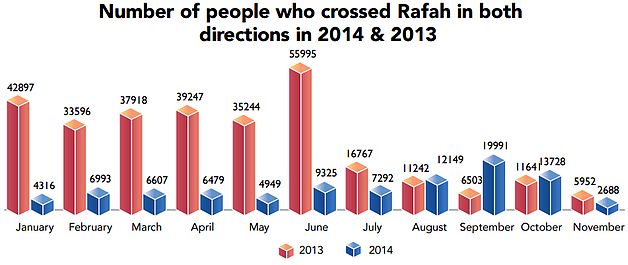1.8 million people ‘locked in’ due to the closure of Rafah crossing and Israel’s blockade
Medical conditions of patients delayed are likely to deteriorate
On 24 October, the Egyptian authorities closed the Rafah crossing between Egypt and the Gaza Strip until further notice. This followed an attack in the northern Egyptian city of Al Arish, reportedly carried out by radical groups based in the Sinai Peninsula, in which over 30 Egyptian military personnel died.
Given the severe restrictions on the movement of people in and out of Gaza via Israel, the closure of Rafah prevents the Palestinian population from exiting, while thousands of others cannot return. The current closure of Rafah crossing is the longest recorded since 2007 and raises a range of humanitarian issues.
By the end of November, 30,000 people were estimated to be waiting to exit Gaza via Rafah, including some 10,000 registered with the Border and Crossings Authority in Gaza. Additionally, there were up to 6,000 Palestinians stranded in Egypt or waiting to return from other countries.
The greatest humanitarian concern is deterioration in the medical conditions of patients seeking treatment abroad or waiting to return home. The Ministry of Health (MoH) estimated that around 1,000 patients were waiting to exit Gaza with conditions including advanced cancer, renal and heart diseases, and orthopedic and ophthalmological needs.
Around 15 medical staff and 1,000 patients stranded outside of Gaza face delays in the continuation of their treatment and at least three life-saving surgeries per week are postponed in Gaza.
Additionally, five foreign medical teams due to arrive in Gaza during November have suspended their travel. In September 2014, ten medical delegations from Kuwait, Sudan, Egypt, Jordan, Germany, France and Morocco were allowed to cross into Gaza from Egypt.
Many Palestinian travelers trying to return home to the Gaza Strip via Cairo airport reported that, due to closure of the Rafah crossing, holders of travel documents issued by the Palestinian Authority are not permitted to board a plane, unless they have a valid visa or residence permit issued by Egypt. Others reported being returned by the Egyptian authorities to the countries they flew in from, at their own expense, or detained in Cairo airport.
Many of those stranded in Egypt are unable to afford their living expenses and some have approached the Palestinian Embassy in Cairo to request financial support. The Embassy stated recently that it has provided small cash sums to over 800 stranded Palestinians, and rented accommodation for a limited number of patients.
The operation of the Rafah crossing has reduced gradually since July 2013, following reports of insecurity and violence against Egyptian security forces in the Sinai. In June 2013 nearly 1,400 people crossed Rafah in both directions every day; this number had reduced to an average of 300 per day just prior to the July-August 2014 war. Movement through the crossing was limited to humanitarian cases only: patients, students, pilgrims, and foreign passport and residency permit holders.

Movement of goods
The closure of Rafah also brought to a halt the entry of construction materials for projects funded by Qatar, as well as selected humanitarian consignments. Since the beginning of 2014, the Egyptian authorities have allowed 358 truckloads of humanitarian items to enter Gaza via Rafah, including medical supplies. According to the Ministry of Health (MOH) in Gaza, prior to July 2013, 30 per cent of medicines and 25 per cent of medical disposables supplied to Gaza were donations entering via Rafah. The entry of construction materials for Qatari-funded projects has had to be rechanneled and these were delivered from Egypt to Gaza via Israel. As a result, Gaza is now entirely dependent on the Kerem Shalom crossing with Israel.
Latest Developments: The Rafah crossing was partially opened for the return of Palestinian travelers into Gaza for four days (26, 26, and 30 November and 1 December) and around 3,200 people were allowed in.









